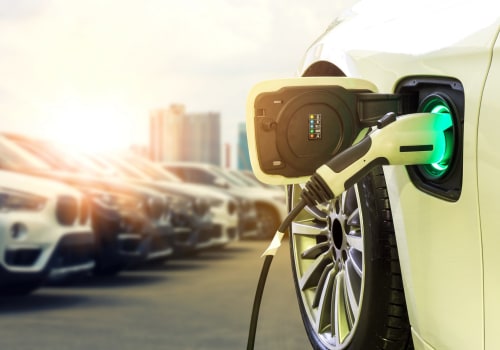As the demand for electric vehicles increases, so do the options for leasing and financing them. Electric vehicles offer a number of benefits, including lower emissions, improved fuel economy, and cost savings. With so many options available, it can be difficult to know which one is right for you. This article will provide an overview of electric vehicle leasing and financing options, as well as helpful tips to consider when making your decision.
From lease versus buy considerations to budgeting for fees, we’ll cover it all so you can make the best decision for your needs.
Electric Vehicle Leasing and Financing Options
Electric vehicles (EVs) are becoming an increasingly popular choice for many drivers due to their environmental benefits, cost savings, and convenience. When it comes to financing your EV, there are several options available, including leasing and financing. This article explores the pros and cons of each option, as well as how to choose the best option for you. Leasing an electric vehicle is similar to leasing a traditional gasoline-powered car. You will make regular monthly payments over a fixed period of time, usually between two and four years.At the end of the lease term, you will have no ownership of the vehicle and must return it to the dealership. The main advantage of leasing is that it generally has lower monthly payments than financing, and there is no long-term commitment. However, you will not own the vehicle at the end of the lease, so you will not be able to benefit from its potential resale value. Financing an electric vehicle is similar to financing a traditional car. You will make a down payment and then make regular monthly payments over a fixed period of time (typically three to seven years).
At the end of the loan term, you will own the vehicle. The main advantage of financing is that you will own the vehicle at the end of the loan term, so you can benefit from its potential resale value. However, financing usually has higher monthly payments than leasing, and you may be required to pay additional fees. When evaluating electric vehicle leasing or financing options, it's important to compare total costs and terms. Look for incentives or tax credits that could help lower your overall cost.
Check for any additional fees or charges that might be hidden in the fine print. Make sure to read all contracts carefully before signing them. It's also important to shop around and compare different offers from dealerships and lenders. Additionally, consider your individual situation when evaluating electric vehicle leasing or financing options. If you're looking for lower monthly payments with no long-term commitment, leasing may be a better option.
But if you want to benefit from potential resale value in the future, financing may be a better choice. Finally, do your research before making a decision. There are many resources available online that provide information on electric vehicle incentives or tax credits that could help you save money. Take your time and compare different options before signing any contracts. In conclusion, electric vehicles are becoming an increasingly popular choice for many drivers due to their environmental benefits, cost savings, and convenience. Evaluate different options carefully by looking at total costs and terms, as well as any incentives or tax credits that could help lower your overall cost.
Do your research before making a decision and make sure to read all contracts before signing them.
Electric Vehicle Incentives and Tax Credits
Electric vehicles (EVs) offer numerous environmental and financial benefits, and many governments offer incentives and tax credits to encourage people to purchase electric vehicles. In the US, federal tax credits are available for purchasing an electric vehicle, as well as for installing a home charging station. Additionally, many states offer their own incentives in the form of tax credits or rebates. When considering the purchase of an electric vehicle, it is important to research and understand all available incentives and tax credits.For example, in the US, the federal government offers a credit of up to $7,500 for the purchase of an electric vehicle. In addition, some states offer additional incentives such as tax credits or rebates for purchasing an electric vehicle. For those who already own an electric vehicle, many states offer credits or rebates for installing home charging stations. Home charging stations provide a convenient way to charge your electric vehicle and can help you save money on electricity costs.
Additionally, some states provide additional incentives such as reduced insurance rates for electric vehicles. In summary, electric vehicle incentives and tax credits can help offset the cost of purchasing or leasing an electric vehicle and installing a home charging station. It is important to research available incentives before making a purchase or lease decision, as they can significantly reduce the cost of owning an electric vehicle.
Researching Different Options Before Making a Decision
When it comes to financing an electric vehicle, it is important to research all of the available options before making a decision. While leasing and financing are the two most common options, there may be other options available that could be more beneficial. It is important to compare the pros and cons of each option and determine which one is best for your needs.In order to make an informed decision, you should research the different financing terms offered by different lenders. Different lenders may have different rates, terms, and conditions. Make sure that you understand the interest rate, length of the loan, early termination fees, and any other fees associated with each financing option. Additionally, you should consider the total cost of ownership over the life of the loan.
Another factor to consider is the availability of incentives for electric vehicles. Many states offer incentives and subsidies to help offset the cost of electric vehicles. Researching these incentives can help you determine if it is beneficial to finance or lease your electric vehicle.
Researching
, options, financing, leasing, incentivesEvaluating Electric Vehicle Leasing or Financing Options
Electric Vehicle Leasing or Financing OptionsWhen it comes to financing your electric vehicle, it can be difficult to decide between leasing and financing.Before making a decision, it's important to evaluate the pros and cons of each option. Leasing an electric vehicle may be more affordable in the short-term, but financing allows you to own the car outright and may be more cost-effective in the long-run. Consider the following factors when comparing leasing and financing options: 1.Cost: Compare the total cost of leasing or financing an electric vehicle over the length of the lease or loan. Be sure to factor in any additional fees, such as taxes, insurance, registration, and maintenance costs.
2.Length of Agreement: When leasing a vehicle, you are typically committing to a shorter agreement than with financing. Carefully consider how long you plan to keep the vehicle and if the agreement will meet your needs. 3.Flexibility: Leasing often offers more flexibility than financing due to shorter contracts and the ability to upgrade or switch vehicles more easily. However, financing allows you to own the car outright, so you can do whatever you want with it.
4.Credit Score: If you decide to finance an electric vehicle, your credit score will be taken into consideration when applying for a loan. If you have a low credit score, leasing may be a better option.5.Additional Benefits: Some lenders offer additional benefits when financing an electric vehicle, such as cash back or discounts on car maintenance. Be sure to inquire about any additional benefits that may be available.
Leasing vs Financing an Electric Vehicle
When it comes to financing an electric vehicle, there are two main options: leasing and financing. Both have their advantages and disadvantages, and it's important to understand the differences between the two before making a decision.Leasing an electric vehicle allows you to use it for a predetermined period of time, usually three to four years. During this period, you make monthly payments that cover the cost of the car, plus interest. At the end of the lease term, you can either return the car or purchase it outright. The main advantage of leasing is that you can get a newer model vehicle at a lower cost than if you financed it.
However, there are some drawbacks to leasing, including restrictions on mileage, additional fees for exceeding the mileage limit, and no ownership rights. Financing an electric vehicle involves taking out a loan to purchase the car. This loan can be from a bank, credit union, or other lender. The main benefit of financing is that you own the car outright at the end of the loan term. Additionally, you may be able to get better terms on the loan if you have good credit.
However, financing an electric vehicle also has its drawbacks, including higher monthly payments than leasing, a longer repayment period (which means more interest paid over time), and the risk of negative equity if you decide to sell the car before the loan is paid off. Ultimately, which option is best for you depends on your financial situation and what you want from your electric vehicle. If you have good credit and want to own your car outright, then financing may be the best option. If you want to pay a lower monthly payment and don't mind returning your car after a few years, then leasing may be the way to go. Electric vehicle leasing and financing options offer many benefits to drivers, including environmental benefits, cost savings, and convenience. Before making a decision on which option is best for you, it is important to evaluate all of your options and consider any incentives or tax credits that may be available.
Researching different leasing and financing options can help you find the best option for your budget and lifestyle. Finally, it is important to remember that electric vehicles are becoming an increasingly popular choice for many drivers. To learn more about electric vehicle leasing or financing options, readers should research different options in their area and investigate any incentives or tax credits available. With all of the options available, drivers can easily find the best option for their needs.











Leave Message